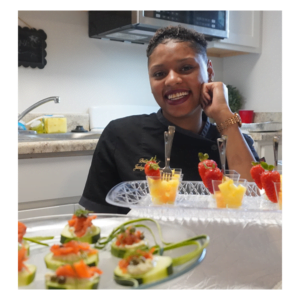Part one of six: What do you expect?
Our contract with the community is about more than keeping kids off the street. It’s about changing the expectation of what we can collectively accomplish.
Judayza Johnson didn’t expect to be homeless at 17. But when mom left town and didn’t return for weeks, cutting off all communication with Judayza, she found herself with nowhere to turn. “At that point, what are your options?” she says. “I’ve seen other young people from my neighborhood in similar situations turn to selling drugs or selling their bodies just to survive. And they don’t try to push you away from it, they try to lure you in. There’s a lot of pressure to just give up and go that route.”
But Judayza remembered hearing a presentation from the Huckleberry House at her school. She kept the card she received that day, and she decided to call the number. Today, five years later, Judayza is about to finish her culinary training and has already started her own business as a personal chef. She acknowledges that her life would probably look a lot different if it weren’t for the support and direction she received from Huckleberry House.
While each young person’s situation and challenges are unique, their outcomes have a common denominator: They found the support they needed to see beyond their current crisis. And they connected with people who expected more for them, until they could expect more for themselves.
With 3,000 youth in our community estimated to experience homelessness every year, we have to work together to change expectations about what is and isn’t acceptable in a community as dynamic and prosperous as ours.
So, let’s keep asking ourselves, “What do we expect for our young people?”
The answers will fuel the momentum and open the door to more meaningful, sustainable changes. And when we make better options readily available to our at-risk youth, the young people will take it from there.
|



